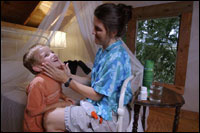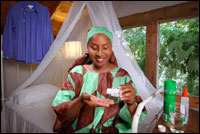CDC Features
Current Features
Don’t Let Mosquito Bites Ruin Tropical Travel This Winter

The good news is that you can take steps to prevent malaria, dengue, and other diseases spread by mosquitoes. To learn whether there is a risk of mosquito-transmitted diseases in areas you plan to visit, select your travel destination from the CDC Travelers' Health Web site and read this important information.
Take these steps to protect yourself.
Prevent Mosquito Bites

Parents should apply insect repellent on their children as well as on themselves.
If you are traveling to areas with mosquitoes, you should:
• Apply insect repellent according to product directions to prevent mosquito and other insect bites.
• For adults, insect repellent should contain 30%-50% DEET or picaridin, which is available in 7% and 15% concentrations but needs more frequent application. There is less information available on how effective picaridin is at protecting against all of the types of mosquitoes that transmit malaria. For detailed information about insect repellent use, see Insect and Arthropod Protection.
– For additional information regarding the use of repellent on infants and children, please see the "Insect and Other Arthropod Protection" section in Traveling Safely with Infants and Children and the "Children" section of CDC's Frequently Asked Questions about Repellent Use.
– When using sunscreen, apply it before insect repellent.
• Wear long pants, long-sleeved clothing, and a hat outdoors.
• Consider applying permethrin (often found in stores with the camping equipment) to the clothing that you will be wearing during your trip as an additional layer of mosquito bite prevention.
• Sleep under an insecticide-treated bed net, especially if you are not staying in screened or air-conditioned housing.
Note: mosquitoes that transmit malaria are most active between dusk and dawn, while dengue is commonly transmitted by day-biting mosquitoes.
Take Medicine to Prevent Malaria

Be sure to take antimalarial drugs exactly on schedule without missing doses.
If you are going to an area where there is a malaria risk, you can take certain medicines to help protect you from malaria during your trip. Which medicine you take will depend on your own health history and the place you are traveling.
Remember:
• Visit a healthcare provider, ideally 4-6 weeks before your trip.
• Ask for a prescription for a medicine to prevent malaria. Also ask your healthcare provider or pharmacist for clear directions about how to take the medicine properly.
• Take your medicine exactly on schedule without missing doses.
• All of these medicines must be taken for a certain period of time before travel, during travel, and after leaving the malaria risk area.
• It is best to purchase all the medications you need before you leave the United States because buying medications abroad has risks, such as fake drugs (counterfeit).
• It is still important to prevent mosquito bites even if you are taking medicine.
Visiting Family and Friends
Going "home" to visit friends and relatives? Even if you were born in a malaria-risk country, you may still get malaria if you return as a visitor because most likely you are no longer immune. Your children are also susceptible as they did not grow up with malaria exposure. Find out how you can protect yourself and your family.
It's Not Just the Mosquitoes!
Mosquitoes are only one of the concerns to take into account when preparing for travel. You can learn more about the recommended vaccinations and prevention tips for your travel on the CDC Travelers' Health Web site. Visit your healthcare provider 4–6 weeks before travel for any necessary vaccinations and prevention advice. Stay healthy and enjoy your visit!
After You Return Home
If you feel sick during or after your trip (for up to 1 year), especially with a fever, you should see a healthcare provider right away. If you are back home, make sure to tell the healthcare provider that you have recently traveled.
Malaria is always a serious disease and it is sometimes deadly. Take steps to protect yourself and your loved ones.
For More Information
- Don’t Let the Bugs Bite: Preventing Dengue and Other Diseases Spread by Mosquitoes -- listen to this audio podcast about dengue fever and how to avoid it when you travel in tropical and subtropical parts of the world

- CDC Travelers' Health
- CDC Division of Parasitic Diseases
- CDC Division of Vector-Borne Infectious Diseases
Page last updated: December 11, 2007
Content source: National Center for Preparedness, Detection and Control of Infectious Diseases and National Center for Zoonotic, Vector-borne and Enteric Diseases
Content owner: National Center for Health Marketing
URL for this page: www.cdc.gov/Features/WinterTropicalTravel

